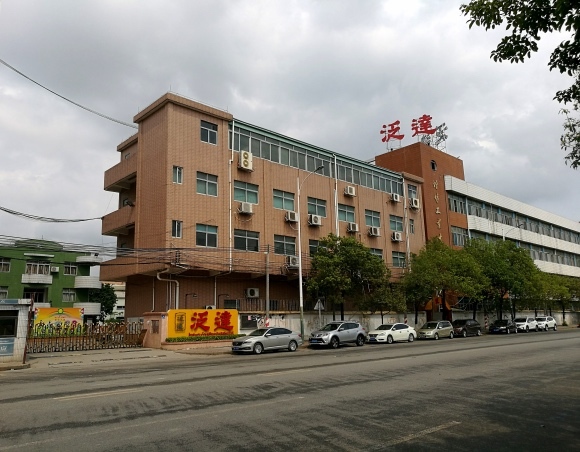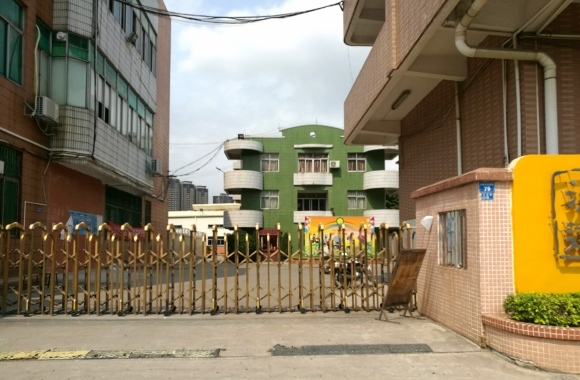With its large orders gone and cash flow slowed to a trickle, the pandemic was the last straw to force the closure of the 28-year-old toy factory.

Entrance of the Fantastic Toys Manufacturing Ltd.’s Dongguan factory. Photo: Liang Zhou
By LIANG Zhou
Translated by GU Yiwei
It wasn’t until LIU Wei, the former general manager of Fantastic Toys Manufacturing Ltd.’s Dongguan factory (hereafter Fanda Toys), announced that they need not come to work anymore until further notice, that the employees finally realized that the company was going under.
Six days later, the Chashan branch of Dongguan Human Resources and Social Security Bureau announced that because of the pandemic, Fanda Toys would no longer be able to sustain its operation, and the lease-holder of the factory facility will advance unpaid wages.
Financial distress caused by declining orders and inability to secure bank loans signaled the end for the 28-year old toy manufacturer. In a new period shadowed by the pandemic, exporters and manufacturers in “the factory of the world” are facing a bleak future.
Sudden closure
LI Hao, a senior manager at Fanda Toys, did not know the company was closing down until March 17. He has worked for Fanda for 20 years and did not expect it to end like this.

The company was founded in 1992. Located in the manufacturing powerhouse of Dongguan, it made toys, clothes, and packaging supplies. Some of its clients are multinationals such as McDonald’s, Disney, Walmart, and Tesco, but Fanda hardly got any media coverage before its closure last month. “The company only came to public attention when it “went bankrupt”, as one of its former employees put it.
In fact, The company had not paid its employees for more than two months. January wages, which were due in late February, was withheld on the ground that the money was “not yet available” due to the coronavirus outbreak. Employees were understanding, however, reckoning that it was inconvenient for the Hong Kong factory owner to coordinate his mainland business during the lockdown. Plus, the company had generally been very on time in paying out wages.
Then, on the morning of March 17, when the payment was finally due, after a few more delays, several local officials in charge of labor affairs showed up in the factory. That afternoon, it was announced that Fanda Toys would be closed for business.
In retrospect, some employees recalled certain warning signs. Li Hao remembered seeing Liu Wei, the general manager, carting away company documents a few days before. He suspected the company was in financial difficulties but there was no way to confirm it. Most others, however, were totally unaware of any problems. “Earlier that day before they announced the closure, we even received a shipment of fabric supplies,” said an employee who had been working at Fanda since 1999.
370 people were working at Fanda Toys when it closed its doors. Since then, they have been in talks with the local government about back pay and other severance compensation. So far, the withheld wages have all been paid by the municipal government, who by law, as the lessor of the factory building, were liable for the unpaid wages. Negotiations on other severance payments, however, are still on-going.
Early warnings signs
To Fanda Toy’s subcontractors, there were even earlier warning signs of financial distress.
In peak seasons, the company would subcontract some of its work to smaller manufacturers. Chen Disheng, a factory owner who had been subcontracting with Fanda for three years, noticed that its payments often came late or incomplete starting in April last year. “We stopped working for Fanda Toys last September out of concern for the unpaid bills. By then they hadn’t fully paid us for our work from April to August.”
He was still owed more than 700,000 yuan (about 100,000 USD) when Fanda Toys went belly-up, which he had hoped to recover by small monthly payments had it been able to hold on for one more year.
Other subcontractors who didn’t cut ties with the toy company incurred even bigger losses. HE Weizhong, another factory owner who had partnered with Fanda for seven years, started to have trouble collecting payments in June of last year. But he valued the partnership, so before the Lunar New Year, when an urgent order from Fanda came, he had his employees work overtime to fulfill it. The 1.5 million yuan promised, however, never materialized. “For that batch, our margins were really thin. Only a few cents for each item. They couldn’t pay us, so now we can’t pay our workers either,” HE Weizhong complained. By his estimate, Fanda owed money to more than ten factories, which Fanda management also confirmed, and the total amount “was at least seven million yuan”.
A common speculation was that even Fanda itself didn’t foresee the looming bankruptcy despite the financial distress. Before the Lunar New Year, the annual holiday party was held as planned, and this year’s party was celebrated with even more fanfare than usual.
Its subcontractors also confirmed this view. “The day before the Lunar New Year, on January 23, every factory I know got some of their bills paid. We got 100,000 yuan. Look, they could have not paid us anything if they knew they were going bankrupt soon.” Chen Disheng believed that there must have been some unforeseen, excruciating circumstances due to the coronavirus outbreak that brought down Fanda Toys.
Broken Cash Flow
In March, the coronavirus outbreak in Europe and North America sent seismic shocks to Dongguan’s economy, which exports 40 percent of its production to these areas.
No one, not even some of Fanda’s senior managers, has been able to fully explain the myriad circumstances that eventually brought down Fanda, but a common belief was that the lack of large orders might have dealt a fatal blow to the company.
According to a former Fanda accounting manager, the company was hit hard by the global pandemic. “There used to be big orders from Europe and America. This year they all got canceled. The ones that remained were far from enough to save the company."
This was debilitating to the company’s cash flow. “We used to borrow from banks using the big orders as collarteral. This year, the orders were gone, so the cash flow was broken.” He said the company had been through many crises, including the recession in 2008. The current pandemic, however, turned out to be even more devastating than 2008.

In fact, in the past few years, large, lucrative orders have been gradually dwindling away. “McDonald's terminated its contract with us to make its gift items in 2014. Since then, the orders were never as big as they used to be. We still made merchandise items for McDonald’s. But it can’t compare with gift item contracts,” according to Sun Xiaoming, Fanda Toys' quality assurance manager.
This pain is felt across the region. Guangdong Province, where Dongguan is located, is the biggest toy exporting area in China. In recent years, a combination of rising labor costs, expensive land, and trade frictions with the US has wreaked havoc on the local exporters. Many of their former businesses are now contracted to Vietnam, where wages are much lower. In 2018, for example, Hasbro canceled a multi-million-yuan order with Fanda and moved it to Vietnam. This is not a single incident.
“Fanda only had less than 20 million yuan worth of orders last year. Compared to hundreds of millions worth of orders in its heyday.” said Sun Xiaoming. With its business shrinking, the company had also cut its workforce. In 2018, it employed over a thousand workers. The number was reduced to 700 in 2019, and a mere 400 before it closed in March. Even for the workers the company was able to retain, the workload was much lighter than before. When the factory resumed production at the end of February after the lockdown, there was never any overtime request, and all the weekends were off, which used to be a rare occurrence in Fanda.
Workers Scattered, industry in siege
The 370 workers all left the factory the day they got back their withheld wages. Many of them had worked there for more than ten years. They felt emotional about the turn of events.
“We spent our youth here,” CHEN Xing said. He had been with Fanda for twenty-one years. Business was booming when he first joined. Three thousand people were working shifts, and there was then even a side factory in a neighboring town. “There seemed to be endless work back then. We worked late every night, except for Sundays.” Chen Xing recalled.

The entire toy manufacturing sector in Dongguan is experiencing a drain of its labor force. Workers older than Chen Xing left long ago. Some retired. Some went to work for more profitable industries. Younger workers either find the unskilled work unappealing, or are unwilling to toil the grueling hours to learn more complicated tasks. Additionally, recent minimum wage law makes it too expensive for the factories to hire novices.
A few other factories approached Fanda the day it closed, hoping to hire some of the newly laid-off workers. A face mask factory, whose manager used to work at Fanda, hired about fifty people. Some workers were able to find jobs at other factories. A few remained unemployed. In the pandemic, there are not nearly as many jobs as normal times.
2020 will likely be a difficult year for Dongguan. For the toy exporting sector alone, the pandemic has already caused tremendous disruptions. Some companies cannot fill orders as production was halted during the lockdown. Some saw their overseas orders suspended. Other sectors also face similar challenges.
In late March, a big watch maker decided to close its factory for three months, if not indefinitely, after its biggest client, Fossil Group, cancelled all orders. Another headphone maker laid off more than a thousand temporary workers after its stock went into freefall due to the outbreak. And the shock is rippling through businesses along the supply chain.
Chen Xing, however, remains optimistic. He knows of a factory that still has enough orders to last it until July, and the manager already agreed to subcontract some of the work to him. “Hopefully, things will turn around in September or October. As long as we survive this year, next year is going to be better,” he said.
(Li Hao, Chen Disheng, Chen Xing, He Weizhong, Sun Xiaoming are pseudonyms.)